The Marsalis Family - A Jazz Celebration
In 1981, trumpeter Wynton Marsalis and saxophonist Branford Marsalis burst on the scene as the young lions who started a jazz renaissance. They were followed by their younger brothers, trombonist Delfeayo and drummer Jason. Incredible as it sounds, they’ve never recorded together as a family. On August 4, 2001, at the University of New Orleans, they performed with their father, the esteemed pianist and educator Ellis Marsalis in a concert that marked his retirement from the school’s jazz department. Supported by bassist Roland Guerin, the family delivers a swinging live program of standards and original works in trio, quartet, and sextet combinations. The elder Marsalis’s pristine pianism colors his midtempo tune “Swingin’ at the Haven,” while Jason Marsalis’s Afro-tinged intro peppers the standard “The Surrey with the Fringe on Top.” Wynton and Branford declare their brotherly love on the saxophonist’s Ornette Coleman-esque “Cain and Abel.” Actor-singer-pianist Harry Connick Jr. joins in on the fun with “Twelve’s It” and “St. James Infirmary.”
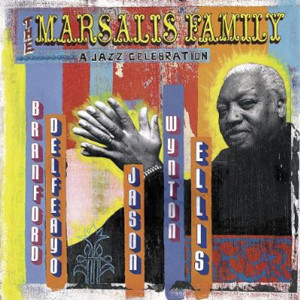
Album Info
| Ensemble | The Marsalis Family |
|---|---|
| Release Date | April 15th, 2003 |
| Recording Date | August 4, 2001 |
| Record Label | Marsalis Music |
| Catalogue Number | 11661-3302-2 |
| Formats | CD, DVD, Digital Download |
| Genre | Jazz Recordings |
Track Listing
| Track | Length | Preview |
|---|---|---|
| Swingin’ at the Haven | 6:56 | Play |
| Surrey with the Fringe On Top | 8:01 | Play |
| Wynton Speaks | 0:29 | Play |
| Cain and Abel | 6:13 | Play |
| Nostalgic Impressions | 6:46 | Play |
| After | 3:53 | Play |
| Sultry Serenade | 5:14 | Play |
| Twelve’s It | 7:50 | Play |
| Harry Speaks | 0:56 | Play |
| Saint James Infirmary | 5:27 | Play |
| Struttin’ With Some Barbecue | 10:02 | Play |
Liner Notes
Many have tried, but prior to the evening of August 4, 2001, none had succeeded in bringing Ellis Marsalis and all four of his music-playing sons together on the same bandstand. Dovetailing schedules is no simple matter for the members of the most prominent and active family in jazz. It was not until the University of New Orleans scheduled a tribute concert to mark Ellis’ retirement from its music faculty and the establishment of a chair in his honor that the much-anticipated conjunction took place. The event was guaranteed to be memorable, but could it live up to the expectations that had been building for the better part of two decades?
The thing that stands out in my mind about the concert is that it was an accurate representation of our family, collectively and individually. – Delfeayo Marsalis
The eloquent, intense and infectious music on this disc is evidence that the concert was one of those rare occasions when potential is fully met and talented performers respond to an obvious challenge. We could credit the professionalism of each Marsalis, the sense that whatever the surrounding hullabaloo there was music to be played and played well, and this attitude no doubt permeates all of their music making. Yet it is clear that the guiding power and spirit of Ellis Marsalis also elevated the collective effort, turning the evening into not just a family celebration but a reminder of all that Ellis has meant to the hometown he loves.
That type of outpouring of love and support for my father has never happened in New Orleans before. It was great that so many people from the city showed up to pay respects to him, because I can remember all of the times when nobody came to the gigs.
– Wynton Marsalis
At his core, Ellis Marsalis is a modern jazz musician. The term may seem dated in the music’s second century, but it carried particular weight when Ellis was coming of musical age in the 1950s and ‘60s – especially in a city where tourism determined that the vast majority of jazz musicians had no choice but to be traditionalists, and the vast majority of pianists sought security in the burgeoning field of rock and roll. Ellis was different, more attuned to jazz’s future than its past or pop’s present. His harmonic and rhythmic language and his sense of compositional possibilities were up-to-the-minute and on the same wavelength as those of the era’s celebrated innovators. This was common knowledge to the Adderley Brothers, Ornette Coleman and other leading players who crossed Ellis’ path, but a virtual secret in New Orleans, where jazz was still supposed to deal in direct homage to such favorite sons as King Oliver, Jelly Roll Morton and Louis Armstrong.
Ellis has no problem with the notion of playing tribute to these immortals, as the present celebratory version of “Struttin’ with Some Barbecue” makes abundantly clear. His own musical concepts were totally contemporary, however. Not only did he develop a lean and quietly commanding approach to the piano trio, captured here on “The Surrey with the Fringe on Top” and his original “After,” but he also helped create modern movement in New Orleans through his work with the collective American Jazz Quintet and his own quartet. He even opened a club, the Music Haven, to give these local renegades a place to be heard. “Swinging at the Haven,” “After” and “Twelve’s It” were all composed in the early ‘60s, and find Ellis dealing with the colors and forms that such pioneers as John Coltrane and Wayne Shorter were investigating at the time. Each of these pieces possess the melodic strength and structural challenges that give tunes extended life, and any or all might have become jazz standards had Ellis chosen to raise his profile by touring more widely or relocating to New York. Instead, he remained at home, and the performing world’s loss became jazz education’s gain.
Learning has always been more important to my dad than the sense of established order. His quest with students was all about taking them to a better place intellectually, not teaching them to know their place.
– Branford Marsalis
In over a quarter-century of teaching that began at the high school level (most notably at the New Orleans Center for Creative Arts) and ultimately led to his faculty appointment at the University of New Orleans, Ellis has been one of the most tireless and inspirational jazz educators to be found anywhere. If the number of world-class musicians he has mentored is any indication, he may be the most successful as well. Terence Blanchard, Donald Harrison and Nicholas Payton are among the notables who have benefitted from his guidance, as have Roland Guerin (the bassist who completed the family band in this concert) and Harry Connick, Jr. (who performed the “St. James Infirmary” heard here with trombonist Lucien Barbarin in the concert’s opening set, and who plays the second, bass-clef centered piano solo on “Twelve’s It”). This illustrious group of alumni gained a thorough grounding in jazz fundamentals, an overriding commitment to the music, and the confidence to pursue their own creative paths. Nowhere is this clearer than among the four talented players linked to Ellis by both biological and aesthetic bloodlines.
My first impression of the Marsalis family was an incredible seriousness for the music. A passion for it. – Harry Connick, Jr.
If it took the emergence of tenor saxophonist Branford and trumpeter Wynton Marsalis, and the subsequent appearance of trombonist Delfeayo and drummer Jason Marsalis to bring attention Ellis’ way, there is no question that the father’s example set the sons on the path of international influence and distinction. There were no gimmicks like a family band in the Marsalis sibling’s childhoods, and no demands that they follow in their father’s footsteps. By all accounts, it was Ellis’ wife Dolores who saw to it that the youngsters practiced, and who ensured that they were exposed to the widest variety of cultural and intellectual stimulation. Dolores was essential in molding her talented sons (and that goes for Ellis III and Mboya as well as the four who play music), while Ellis provided the example of vision and dedication that allows a musician to pursue his or her chosen path. The success of both Ellis and Dolores as role models permeates these performances.
I do have a lot of pride in my sons. They were able to make music work as a profession by playing what they choose to play.
– Ellis Maralis
The source of Ellis’ pride can be heard throughout this collection, though it stands in bold relief on three particular tracks. Drummer Jason sets the mood for “Surrey with the Fringe on Top,” then extends it in a dramatic solo in which virtuosity is at the service of musical content. Delfeayo honors the trombone’s storied heritage and adds his own assertive stamp to “Sultry Serenade,” composed by Tyree Glenn and Duke Ellington for the Ellington Orchestra in 1947. The trumpet of Wynton and the tenor sax of Branford provide the clearest example of family affinity as they sustain a dialogue through the course of Brandford’s blues “Cain and Abel” that is by turns, witty, funky and fierce. These Marsalis brothers worked side by side 20 years ago in Art Blakey’s Jazz Messengers and Wynton’s first band, before striking out on distinct and sometimes divergent paths. They recorded “Cain and Abel” once before (on Branford’s 1991 album The Beautyful Ones Are Not Yet Born), and the rareness of their empathy was notable then. Ten years later, the connection is even stronger, reinforced by the presence of the proud papa who enjoyed this incendiary performance from the piano bench.
The only rehearsal we were able to schedule was really rough. A lot of slips, starts and stops. It looked as though the show might have been a disaster. But once everybody got on stage, everything came into focus. The music just took off.
– Jason Marsalis
Often as not, family reunions will produce angst rather than art. Such was not the case when the Marsalis clan gathered on August 4, 2001. The common spirit and collective eloquence on display was the finest tribute the father could receive. This family came together, and as the enclosed music affirms, they played together brilliantly.
– Bob Blumenthal
Credits
Produced by John McLure
Recorded by John McLure and Stan Dacus
Mixed by Branford and Delfeayo Marsalis
Recorded live August 4, 2001 at Kiefer UNO Lakefront Arena in New Orleans, LA
Live Audio Assistant: Susan Presson
Mixed September 6 & 7, 2002 at Ocean Way Studios in Nashville, TN
Assistant Engineers: Bryan Graban
Mastered by Greg Calbi at Sterling Sound in New York, NY
Special thanks to: Nicole and Trena, Ellis III, Mboya, Reese, Wynton II, Simeon, Django, Maria, Jasper, Peyton and Jazmine.
Also I thank Ann Marie, Sherry, Ed, Vernon, Rod, Rob and the supporting casts at Wilkins Management and the Management Ark.
Additional thanks to Roland Guerin, the folks at Marsalis Music and Rounder Records, Kathey Marsella, Bob Blumenthal, Don Lucoff, Michel Comte, Herman Leonard, Greg Tesdahl.
Thanks to Phil Byrd, Janet Shapiro, John McClure, and the staff at Brandenburg Productions and also to Randall Feldman and the staff at WYES.
We also thank the SUPREME SPIRITUAL BEING without those guidance and blessing none of this would be possible.
“In the twelve years I spent at UNO I met many people who have influenced my growth, students and faculty alike. It would be impossible to remember all of them so I will apologize at the outset for those I may have missed. I thank all of the students I helped and apologize to those who I failed to help and hope they understand that I did my best. I want to acknowledge Chairman Jeff Cox, Sue, the entire Classical faculty and especially Mary Ann with whom I shared many piano students.
A special thanks to Harold, Ed, Steve, Charlie and the entire adjunct Jazz faculty who kept the faith. The administrative support system was invaluable to our existence. I thank Chancellor Gregory O’Brien and former Coca Cola executive Ron Jones who were each instrumental in establishing the Coca Cola Endowed chair of Jazz Studies and Provost Lou Paradise, Dean Phil Coulter and Vice Chancellor Shirley Laska whose assistance was invaluable in making our recording studio a reality. Also brothers Dillon and Angel who helped me steer clear of administrative pitfalls.”
“I especially thank my wife Dolores for the unselfish love and dedication that only she could have given to us. She is truly the mother of us all.”
Swinging at the Haven (6:56)
Writer: Ellis Marsalis
Publisher: Marzique Music Co. Inc. (BMI)
The Surrey with the Fringe On Top (8:01)
Writer: Richard Rodgers/Oscar Hammerstein II
Publisher: Williamson Music (ASCAP)
Wynton Speaks (0:29)
Cain and Abel (6:13)
Writer: Branford Marsalis
Publisher: Steeplone Music, Inc. (ASCAP)
Nostalgic Impressions (6:46)
Writer: Ellis Marsalis
Publisher: Branwynn Music (ASCAP)
After (3:62)
Writer: Ellis Marsalis
Publisher: Marzique Music Co. Inc. (BMI)
Sultry Serenade (6:14)
Writer: Tyree Glenn
Publisher: Music Sales Corp. (ASCAP)
Twelve’s It (7:50)
Writer: EIIis Marsalis
Publisher: Marzique Music Co. Inc. (BMI)
Special guest: Harry Connick, Jr. (piano)
Harry Speaks (0:56)
Saint James Infirmary (5:27)
Writer: Joe Primrose
Publisher: Irving Mills/EMI Music Publishing (ASCAP)
Special guest: Harry Connick, Jr. (piano), Lucien Barbarin (trombone)
Struttin’ with Some Barbecue (10:02)
Writer: Lillian Hardin Armstrong and Don Raye
Publisher: Universal MCA Music Publishing (ASCAP)
MUSICIANS:
Ellis Marsalis (piano)
Branford Marsalis (saxophones)
Delfeayo Marsalis (trombone)
Jason Marsalis (drums)
Wynton Marsalis (trumpet)
Roland Guerin (bass)
Special Guests:
Harry Connick, Jr. (piano)
Lucien Barbarin (trombone)
Art Direction & Design: Arnold Levine
Cover Art Illustration (front & back): Greg Tesdahl
Cover Art Photograph: Michel Comte
Performance Photographs: Herman Leonard
Art Associate: Steven Jurgensmeyer
Email: [email protected] / www.marsalismusic.com
Personnel
- Ellis Marsalis – piano
- Branford Marsalis – tenor sax, soprano sax
- Delfeayo Marsalis – trombone
- Jason Marsalis – drums
- Roland Guerin – bass
- Harry Connick, Jr. – piano, vocals
- Lucien Barbarin – trombone
Also of Interest
-
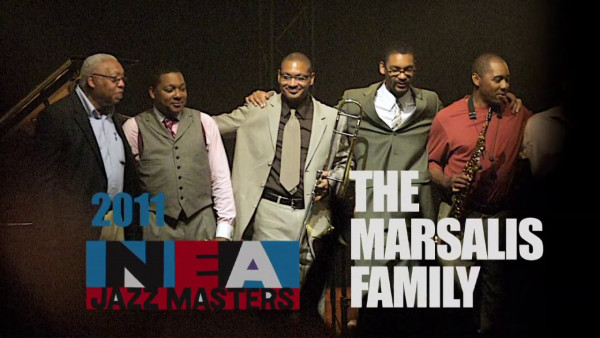 Videos
Videos
2011 NEA Jazz Masters Tribute to the Marsalis Family
-
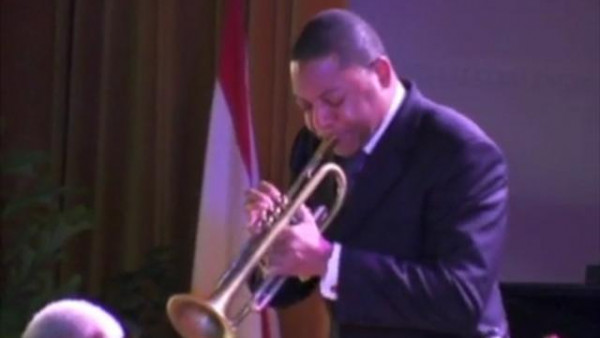 Videos
Videos
St. James Infirmary - Wynton and Ellis Marsalis at Tulane University
-
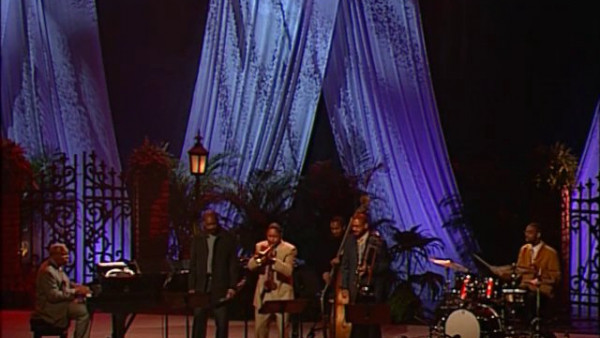 Videos
Videos
Struttin’ With Some Barbecue - The Marsalis Family (DVD clip)
-
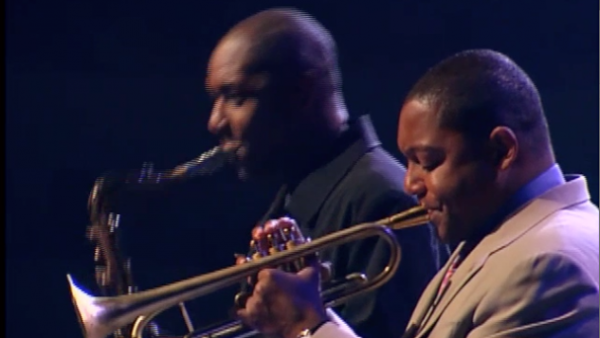 Videos
Videos
Cain and Abel - The Marsalis Family (DVD clip)
-
 News
News
Interview: Ellis and Wynton Marsalis
-
 News
News
Ellis Marsalis and Sons Plan Rare Family Performance at Jazz Festival
-
 News
News
The Marsalis family on the Tonight Show with Jay Leno
-
 News
News
DVD version of “Marsalis family” in stores now
